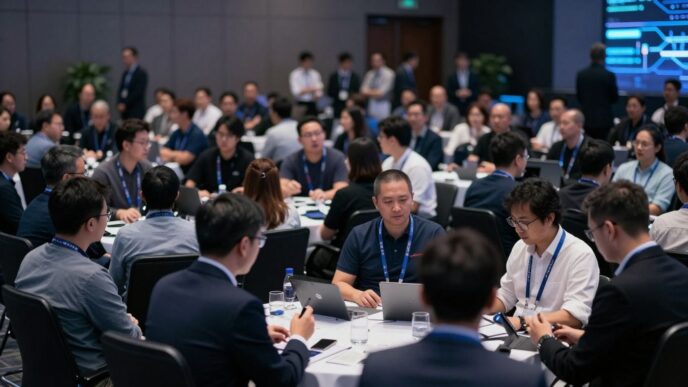Cognition AI’s Explosive Valuation and Revenue Surge

It’s pretty wild how fast things are moving in the AI space right now. Cognition AI is a prime example, just landing a massive funding round that values the company at $10.2 billion. This isn’t just a small bump; it’s a huge leap, showing that investors are really putting their faith in what Cognition is building. The whole thing was led by Founders Fund, and they got a bunch of other big names like Lux Capital and Bain Capital Ventures to chip in too. It feels like just yesterday they were a much smaller operation.
Devin’s Impact on Cognition’s Annual Recurring Revenue
So, what’s driving this huge valuation? A big part of it is their AI coding assistant, Devin. Seriously, this thing seems to be a game-changer. Since launching, it’s pushed Cognition’s annual recurring revenue (ARR) from a mere $1 million in September 2024 all the way up to $73 million by June 2025. That’s a 7200% jump in less than a year! It’s kind of mind-boggling when you think about it. Devin isn’t just helping with small bits of code; it’s designed to handle entire software projects, which is a pretty big deal.
The $10.2 Billion Valuation Fueled by Investor Confidence
This $10.2 billion valuation is a clear signal of how much confidence investors have in Cognition’s vision. They’re not just betting on the current success but on the future potential of AI in software development. It’s a tough market out there, with companies like GitHub Copilot already making waves, but Cognition seems to have found its niche. The rapid growth in ARR, largely thanks to Devin, makes it hard for investors to ignore.
Cognition AI’s Strategic Funding Rounds
Cognition has been smart about its growth. They recently brought in over $400 million in new funding. This capital injection is key for them to keep pushing forward. It’s not just about the money, though; it’s about the partners they bring on board. Having major players like Founders Fund and Bain Capital Ventures involved adds a lot of weight and strategic guidance. They also recently picked up Windsurf, an AI coding startup, which they say more than doubled their ARR and boosted their enterprise business significantly. It seems like a well-thought-out plan to build out their product and market presence.
The AI Coding Landscape and Cognition’s Position
The world of software development is changing fast, and AI is right at the center of it. It’s not just about finishing your code lines anymore; we’re talking about AI that can actually build things. Think of it like this: GitHub Copilot is already making a ton of money, pulling in hundreds of millions each year, and it’s still growing like crazy. It’s like the early days of a new tech wave, and everyone’s trying to catch it.
Competition from GitHub Copilot and Other Startups
GitHub Copilot is the big name right now, and it’s doing really well. But it’s not the only player. Other companies are popping up, trying different approaches. Some are focusing on making coding tools smarter, while others, like Cognition, are aiming for something bigger – AI that can handle entire projects on its own. It’s a crowded space, and companies need to stand out.
Cognition’s Agentic Approach to Software Development
Cognition is taking a different path with its AI agent, Devin. Instead of just suggesting code, Devin is designed to manage the whole software development process. This means it can run tests, fix bugs, and even get a project all the way to completion. It’s a big step up from what we’ve seen before. This
Cognition’s Product Evolution and Market Expansion
So, Cognition AI isn’t just sitting around. They’ve been busy making their tools better and reaching more people. It’s like they’re building a whole ecosystem for AI in software development.
Acquisition of Windsurf and IDE Integration
One big move was grabbing Windsurf, another company working on AI coding tools. This wasn’t just about getting more customers; it was about getting a really good Integrated Development Environment (IDE). Think of an IDE as the main workshop for coders, where they write, test, and fix code. By adding Windsurf’s IDE, Cognition now has a more complete package. They say this deal basically doubled their yearly recurring revenue and made their product suite much stronger. It also gave their enterprise business a big boost, like 30% more business in just a couple of months.
Expanding Enterprise Client Base
It seems like the Windsurf acquisition really helped them connect with bigger companies. Before, there wasn’t much overlap between Windsurf’s users and Devin’s users, which is good. It means they could bring Windsurf’s IDE users into the fold without losing Devin’s existing base. Now, they’re working with some pretty big names, like Goldman Sachs, Citi, Dell, and Cisco. That’s a pretty solid list of clients, showing that major companies are starting to trust and use their AI tools for serious work.
Plans for Product Innovation and Engineering Growth
With all this new money and a growing customer base, Cognition is looking to keep pushing forward. They’re talking about more product innovation, which probably means making Devin even smarter and adding new features. They also need to grow their engineering team to handle all this. The goal seems to be solidifying their spot as a leader in AI coding tools and building out what they see as the developer platform of the future. It’s a competitive space, so staying ahead means constantly improving and expanding.
Understanding Cognition AI’s Business Model
So, how does Cognition AI actually make money? It’s not just about building cool AI, right? Their main play is centered around creating a platform for AI agents, specifically for the world of DevOps and software development. Think of it as building tools that help other tools work better, powered by AI.
Platform for AI Agents in DevOps
At its core, Cognition is building autonomous AI agents. The big one everyone talks about is Devin, their AI software engineer. But the idea is bigger than just one agent. They’re creating a whole ecosystem where these AI agents can handle complex software development tasks. This isn’t just about writing a bit of code; it’s about managing projects, running tests, debugging, and even deploying software. They’re aiming to automate large parts of the software development lifecycle, which is a huge deal for companies looking to speed things up and cut costs.
Enterprise Sales Strategy
Cognition is really pushing hard on selling to businesses, or enterprises. They’ve seen a massive jump in their annual recurring revenue (ARR), going from $1 million to $73 million in less than a year. A big part of that growth came after they acquired Windsurf, a company that had its own AI-enabled IDE. That deal alone reportedly more than doubled their ARR and boosted their enterprise business significantly. They’re focusing on companies that need to build and maintain software at scale, offering them a way to do it faster and more efficiently with their AI agents.
Leveraging LLMs for Workflow Automation
Under the hood, Cognition is using large language models (LLMs) – the same kind of tech that powers things like ChatGPT – but they’re applying it in a very specific way. Instead of just generating text, they’re using these models to understand and automate complex workflows. This means their AI agents can interpret project requirements, plan out steps, execute code, and learn from the results. It’s about taking the power of LLMs and making them do actual work in the software development pipeline, automating tasks that used to require a lot of human effort.
Key Financials Driving Cognition AI’s Success
Rapid ARR Growth from $1 Million to $73 Million
It’s pretty wild to think about how fast Cognition AI has grown. Just a little while ago, their annual recurring revenue, or ARR, was sitting at a modest $1 million. But then, things really took off. With the introduction of their AI coding assistant, Devin, that number shot up to an impressive $73 million in less than a year. That’s a massive jump, showing just how much people are ready for tools that can actually help with coding tasks.
Impact of the Windsurf Deal on ARR
Remember when Cognition AI bought Windsurf? That wasn’t just about adding another product to their lineup. It seems like it had a real impact on their ARR too. While Devin was already doing great, merging Windsurf’s existing customer base with Cognition’s own offerings seems to have given their revenue an extra boost. It’s smart business, really – combining forces to reach more people and make their overall package more appealing. They mentioned that the customer overlap between the two companies was pretty small, which means they likely brought in a lot of new revenue streams from the Windsurf acquisition.
Enterprise Business Growth Post-Acquisition
After bringing Windsurf into the fold, Cognition AI has seen some serious growth in its enterprise business. They’re now working with some big names, like Goldman Sachs, Dell, and Cisco. It’s not just about selling to individual developers anymore; they’re landing major deals with large companies. This shows that their AI coding tools are seen as reliable and useful enough for big, established businesses, which is a huge step. It means their platform isn’t just a cool new gadget; it’s becoming a serious part of how these companies operate their software development.
The Future Trajectory of Cognition AI
Consolidating Lead in AI-Driven Coding Tools
Cognition AI isn’t just aiming to keep up; they’re focused on leading the pack in AI tools for software development. With their recent funding boost and the acquisition of Windsurf, they’ve really beefed up their product lineup. They’re combining Devin, their autonomous coding agent, with a solid IDE. This move is all about making sure developers have a complete AI-powered environment right at their fingertips. Think of it as building the whole toolbox, not just a single wrench. They’re seeing a lot of interest from big companies, which shows that this approach is hitting the mark.
Positioning as the Developer Platform of the Future
The company’s big play is to become the go-to platform for developers, powered by AI. They’re not just building a tool; they’re building an ecosystem. By integrating agentic capabilities directly into the development workflow, they want to change how software is made. This means handling everything from initial coding to testing and deployment, all with AI assistance. The goal is to make development faster, more efficient, and maybe even more enjoyable for engineers. It’s a bold vision, but one that seems to be gaining serious traction.
Navigating the Competitive AI Race
Let’s be real, the AI space is crowded. Companies like GitHub Copilot are already making waves, and other startups are constantly popping up with new ideas. Cognition knows this. They’re up against some serious players, and the pace of innovation is relentless. However, their focus on autonomous agents that can handle complex tasks sets them apart. They’re betting that this deeper level of AI integration will be the key to staying ahead. It’s a high-stakes game, and Cognition seems ready to play it out, aiming to solidify its position as a major force in the evolving AI landscape.
What’s Next for Cognition AI?
So, Cognition AI is making some serious waves, hitting a $10.2 billion valuation after landing over $400 million in new funding. It’s pretty clear investors are really betting on their AI coding assistant, Devin. The company saw its revenue jump from basically nothing to $73 million in less than a year, which is wild. Plus, they picked up Windsurf, which seems to have beefed up their product line and business even more. They’re already working with big names like Goldman Sachs and Dell. Now, they’re looking to grow their engineering team and keep pushing out new products. It definitely looks like Cognition AI is carving out a major spot for itself in the fast-moving world of AI software development.














